Linguacultural Artefacts for Translation Training
This paper explores the implementation of a «phygital» approach in Turkish-Russian translation training, using traditional Turkish folk songs, known as Türkü, as linguistic and cultural artifacts. Türkü carry significant layers of meaning, making them invaluable resources for training future translators and philologists. Despite extensive research on türkü, studies focusing on its translation are scarce. The paper advocates for a phygital approach, blending physical and digital dimensions to be implemented in the training process of translators and philologists. The study is grounded in cognitive theories of language, emphasizing language as a primary encoding system that shapes human perception of reality. The theoretical framework integrates onomasiological approaches to language and considers translation as a process of structural and semantic transformations between distinct encoding systems. The results of this and previous studies reveal the efficacy of generative models in capturing certain linguistic and cultural aspects but underscore the indispensability of human involvement, particularly in context-based interpretation and post-translation analysis. The research advocates for a balanced integration of artificial intelligence and human expertise in translation education, with educators serving as mentors to guide students through linguistic and cultural intricacies.



